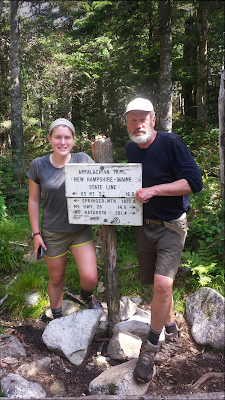It sounds daunting, and I have heard it is. Rob Whiteside and daughter Phoebe are doing just that this AM. This is the final stretch of their Appalachian Trail through-hike. I'm happy they are together, at least each evening when Rob catches back up to her!
Because they won't be able to read this until they are done, I will add that Maine is where the recent news came of the finding of a "lost" hiker from 3 years ago occurred. (Addendum: They have already passed the area where this occurred!) Her husband found the trail too daunting here and she decided to go on by herself. She followed the trail protocol for a bathroom break* and never found the trail again! She kept a log of her 30 days of wandering and finally succummed to starvation in her tent on a hill-top clearing 1/2 mile from the trail, 3 miles away from where she left it.
*Don't expect flush toilets on the A.T. Most A.T. shelters have privies, but often you will need to do your business in the woods. Proper disposal of human (and pet) waste is not only a courtesy to other hikers, but is a vital Leave No Trace practice for maintaining healthy water supplies in the backcountry and an enjoyable hiking experience for others.
No one should venture onto the A.T. without a trowel or a wide tent stake, used for digging a 6- to 8-inch deep "cathole" to bury waste. Keep in mind the following guidelines when pooping in the woods:
- Bury feces at least 200 feet or 80 paces away from water, trails, or shelters.
- Use a stick to mix dirt with your waste, which hastens decomposition and discourages animals from digging it up.
- Used toilet paper should either be buried in your cathole or carried out in a sealed plastic bag.
- Hygiene products such as sanitary napkins should always be carried out.
- Use soap and water; hand sanitizers kill some germs but are not as effective against norovirus.

